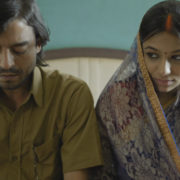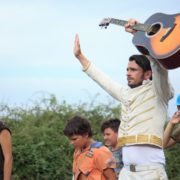Montreal World Film Festival underway despite difficulties
Montreal World Film Festival underway despite difficulties
The 41st edition of the Montreal World Film Festival (WFF) is underway and despite its obvious difficulties—lack of printed programs, some venues too distant—one has to salute the almost heroic effort that the organizers have put in making this event possible. There is no question that Serge Losique doesn’t plan to surrender to the intentions of those who want to destroy the festival. He got some backing from Quebecor to save the Imperial Theatre, and in his inaugural speech, he didn’t mention the problems. He preferred to talk about ecology, instead of a red carpet this time the festival had a green carpet. Beyond those extra-cinematic considerations, when one realizes that despite all odds, the WFF, at least until the time I am writing this note, has presented in its Official Competition category an exceptional selection of films, one has to feel good.
Let’s start with the opening movie, “Anna Karenina—Vronsky’s Story” directed by Karen Shakhnazarov. The novel by Leo Tolstoy has been taken to the screen on a few occasions, but this Russian movie focuses on the view that Count Vronsky (Max Matveev) has of his relationship with the beautiful Anna Karenina (Elizaveta Boyarskaya). The dialogue between Dr. Sergey Karenin (Kirill Grebenshchikov) and Vronsky, in an isolated part of Manchuria, is what unravels the story with all the elements of passion and the sorrow for Anna’s fate. It is Russian filmmaking at its best: realistic scenes of the 1904 Russo-Japanese War, an excellent re-creation of the period (the scene of the dance at the Karenine’s place is a cinematic beauty), and solid acting. One just hopes that some national or local distributor shows interest and buys the rights to show this excellent movie to a wider audience.
At a time when many people are questioning the moral calibre of politicians it may seem pertinent to look at the approach taken by Czech director Julius Ševcík to the life of Jan Masaryk—son of the founder of Czechoslovakia—in his film “A Prominent Patient.” The main character played by Karel Roden is a diplomat at the critical time of Hitler’s demands over the Sudetenland. Masaryk, however, is at the same time battling his own demons in the form of drug addiction. “A Prominent Patient” is also a serious contender for some distinction at the WFF although the subject may be a little bit obscure for many people.
Then we have this unexpected jewel coming from an Albania: “Elvis Walks Home” directed by Fatmir Koci. This is a movie that at first seems to start on a comedic note but soon takes us on a more dramatic twist when our protagonist, an Albanian refugee living illegally in London who impersonates Elvis, is wrongly hired to entertain the British troops during the Balkan War of 1999 in Bosnia-Herzegovina. When his real identity is discovered, he manages to escape from Sarajevo, still wearing his Elvis costume. His life, however, will take a turn for the worse when he gets in the middle of the brutal conflict in which he would also find an unusual gang of child-soldiers, in fact, orphans escaping the conflict too.
In the category First Works, I had the chance to see “Veronica” by Mexican directors Carlos Algara and Alejandro Martinez Beltran which presents an interesting plot in the form of some mental labyrinth whose real meaning is only revealed at the end of the movie. My only objection is to the recourses used by the directors to convey the idea which at times seems somehow forced and artificial. The plot, however, is in general appealing, although some scenes may be too scary.
The Montreal World Film festival continues until Monday, September 4. Awards will be presented on Sunday, September 3. For detailed information including schedules, film descriptions and venues visit:

By: Sergio Martinez – mtltimes.ca






